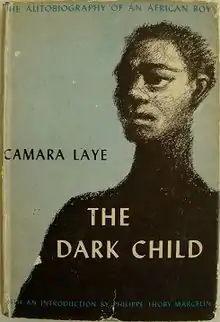The African Child
The African Child is an autobiographical French novel by Camara Laye published in 1953 as L'enfant noir.[1] It tells the story of a young African child, Baba, growing up in Guinea. The novel won the Prix Charles Veillon writing prize.
 First English-language edition | |
| Author | Camara Laye |
|---|---|
| Translator | James Kirkup |
| Country | Guinea |
| Language | French |
| Genre | Autobiographical |
| Publisher | Plon |
Publication date | 1953 |
Published in English | 1954, Farrar, Straus & Giroux |
It was translated into English by James Kirkup and issued in the US in 1954 as The Dark Child.[2]
It was adapted into a movie called L'enfant noir in 1995.[3] Many of the cast in the film were relatives of Laye.[4]
The scenes early in the novel, when the young narrator witnesses his father working on gold, have drawn considerable critical attention, for its spiritual overtones[5] but also because of the importance of the douga, the song and dance begun by the griot when the work is complete.[6]
References
- Prima Birungi. "The African Child (by Camara Laye)". Africa Book Club.
- Birch, Dinah; Hooper, Katy (2013). The Concise Oxford Companion to English Literature. OUP Oxford. p. 108. ISBN 9780191036743. Retrieved June 11, 2020.
- "L'enfant Noir: Un long-métrage de Laurent Chevallier: Dossier Pédagogique" (PDF). clermont-filmfest.com (in French). Retrieved 1 October 2015.
- "The Dark Child by Camara Laye" (PDF). Literary Cavalcade. April 2004. Retrieved 1 October 2015.
- Ada Uzoamaka Azodo (1994). "The Work in Gold as Spiritual Journey in Camara Laye's The African Child". Journal of Religion in Africa. 24 (1): 52–61. JSTOR 1581374.
- Esonwanne, Uzo (1993). "The Nation as Contested Referent". Research in African Literatures. 24 (4): 49–62.
This article is issued from Wikipedia. The text is licensed under Creative Commons - Attribution - Sharealike. Additional terms may apply for the media files.